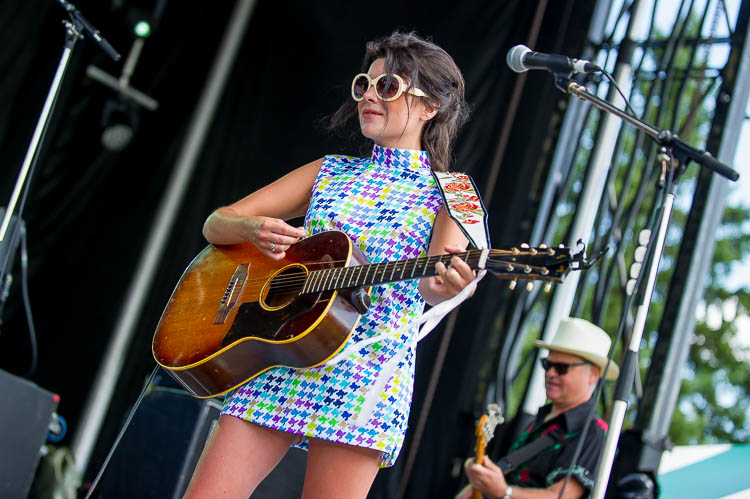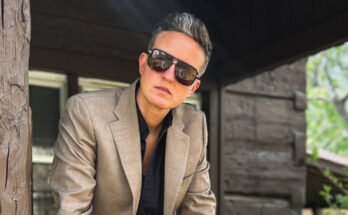Whitney Rose has never been daunted or intimidated by challenges. Whether she’s perusing the possibilities that accompany a new project, or following up on her early transition to residency in Austin, she’s always eagerly embraced any opportunity to further amplify her art and her career.

That’s certainly the case with her upcoming album, We Still Go to Rodeos, released on April 24, 2020 on Rose’s own artist/management-run record label, MCG. Indeed, it continues a tradition Whitney has adhered to from early on — that is, the ability to share sentiments and scenarios that all of us can relate to simply by being participants in the sometimes tenuous adventure we call life. Produced byPaul Kolderie, whose impressive resume includes Radiohead, Uncle Tupelo, Pixies, Toots & Maytals, Hole, and Morphine, among the many, it’s a stunning set consisting of 12 songs, all of which were penned solely by Whitney herself. While the sound, style and stance retain her trademark reverence for Americana authenticity, her confidence and creativity elevate her to a new plateau. There’s a familiarity factor to be sure, but the album also reflects a rugged independent spirit, one that takes its cue from the best of the Texas tradition, as exemplified by artists such as Lucinda Williams, Guy Clark, Townes Van Zandt, and Jerry Jeff Walker.

“I draw from a lot of different influences, but I’d like to think there’s a certain uniqueness in my work,” Whitney herself remarks. “I don’t want to make the same album over and over again and this one is no different. I’m not changing styles or redirecting my career as much as I’m expanding on avenues that I’ve explored previously. Maybe it’s because I heard Marty Stuart call Tom Petty and the Heartbreakers the best country band of all time and I got excited. In any case, this record has some distinct differences in production style and instrumental focus from previous works and I’m proud of the outcome.”
Indeed, in launching her own label, Whitney is following in the footsteps of other artists who were decidedly determined to control their own work, and, as a result, their own destinies. She doesn’t do it alone — guests on the album include such storied session players as guitar slinger Gurf Morlix (Lucinda Williams, Warren Zevon etc.), drummer Lisa Pankratz (Dave Alvin, Billy Joe Shaver, Hayes Carll), bassist Brad Fordham (Jerry Jeff Walker, Dave Alvin), guitarists Dave Leroy Biller (Texas Playboys, Deke Dickerson, Hunt Sales), and Rich Brotherton (Robert Earl Keen, Ronnie Lane, Ian McLagan) — but given her authoritative stance, there’s no doubt as to whose vision guides each of the album’s offerings. Whether it’s her description of a girl trapped on the wrong side of the tracks, as profiled on the driving and determined album opener “Just Circumstance” (“They all say ‘bless her heart’/she never had a chance”) or the shameless seductive sway of “Home With You,” the sultry caress of “You’d Blame Me for the Rain,” the confessional remorse of “Through the Cracks” or the optic in energy shared through “A Hundred Shades of Blue,” Whitney offers a full array of emotional expression.
Given the critical kudos she’s received in the past, it’s no surprise that she’s again managed to not only rise to the challenge but to stake out new terrain as well. After all, here’s an artist The New York Times described as “a sultry country classicist with a tremble in her voice … partial to the magisterial gestures of the 1950s and 1960s.” Rolling Stone concurred, proclaiming, “This Texas-based singer’s 21st-century update of classic country’s most cherished ideals — boot-stomping rhythms and take-no-guff lyrics — is rich with wry wisdom, its full-bodied arrangements putting the spotlight on her sweetly tart soprano.”
Those are decidedly distinct honors for a woman who has built a career strictly on her own terms. Surrounded by the sounds of country music while growing up, she knew, even as a child, what she wanted to do. When she was old enough she picked up a guitar, started learning other people’s songs and left home to pursue music. She became a regular at a club called the Cameron House in Toronto, which, at the time, happened to be launching its own record label. Cameron House gave her opportunity to release her first two albums — an eponymous debut in 2012 and the Raul Malo-produced Heartbreaker of the Year in 2015.
A signing with revered Six Shooter Records transpired soon after, as did her relocation to Austin in 2015. She recalls rolling into that city for the first time at 2 a.m., going straight to bed and then meeting a new band the next morning. She and the musicians rehearsed all day and made their debut at the city’s iconic Continental Club later that evening. That led to a residency that was only supposed to last two months. She quickly gained an audience of avid devotees and found herself ingrained in Austin’s vibrant singer-songwriter scene. What was supposed to be a temporary stay evolved into a continuing commitment, and her decision to make Austin her permanent home. She still plays at the Continental Club weekly when her increasingly busy touring schedule allows.
Other achievements transpired in rapid succession. She self-produced the 2017 EP South Texas Suite, recorded as an ode to her new home, and found herself working with Malo (and The Mavericks) again when Malo reprised his role as producer for her next LP, Rule 62, released later that same year. The album garnered all kinds of critical kudos and established the fact that indeed, Whitney Rose was, without a doubt, an artist of significant standing.
Now, after more than 500 concerts around the world, including a number of festival appearances (Stagecoach and Montana’s Under the Big Sky gathering among them, slated for later this year), Whitney has clearly etched a reputation as one of the most distinctive and dynamic voices on the contemporary country scene today.
We Still Go to Rodeos affirms that standing, another chapter in a continuing trajectory that’s scaled one plateau after another. Let’s leave it to Whitney herself to sum things up succinctly:
“I feel like I’m in a good place with the release of this record,” she suggests. “I haven’t done everything I’d like to do in my career, but I’m very grateful to look behind me and see that I’ve steadily — albeit slowly — climbed upwards and achieved some of my goals. As far as I can tell, no music career or road to success is ever the same as another. Mine hasn’t been perfect by any stretch, but when I think about it so far, I never find myself wishing it were different. I’m proud of my output as a songwriter, I’m proud to have had the opportunity to perform in so many places around the world, and I’m extremely humbled and grateful to have worked with so many artists I admire along the way.”


